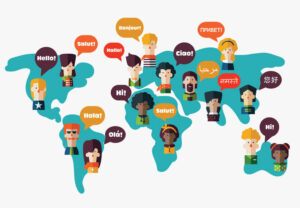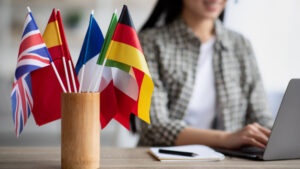Language is not just a tool for communication; it’s a fundamental aspect of identity. Our dialects, the particular forms of language we use based on our geographical location, cultural background, and social group, play a significant role in shaping who we are. Dialects are not merely variations in pronunciation or vocabulary; they carry rich histories, cultural nuances, and a sense of belonging. Understanding the connection between language and identity sheds light on the intricate ways in which our speech reflects and influences our sense of self.
The Diversity of Dialects

Dialects vary widely across regions, often reflecting the unique history and heritage of a particular community. From the melodic cadences of Southern American English to the clipped consonants of British Received Pronunciation, each dialect carries its own distinct characteristics. These linguistic differences are not only audible but also visible in written communication, with variations in spelling, grammar, and syntax. For example, the use of “y’all” in Southern dialects reflects a distinct plural pronoun not found in Standard American English, highlighting the cultural significance embedded within the language.
The Social Significance of Dialects
Beyond regional distinctions, dialects also serve as markers of social identity and belonging. In many communities, the way we speak can signal our social class, education level, or ethnic background. Linguists often study the phenomenon of “code-switching,” where individuals fluidly shift between dialects depending on the social context.
For instance, someone might speak one way with friends and family but adopt a more formal dialect in professional settings. This ability to navigate multiple linguistic registers reflects not only linguistic versatility but also a nuanced understanding of social dynamics. This understanding extends to various aspects of life, including fashion choices like men’s t-shirts, where individuals may select garments that align with their social identity and sense of belonging.
Language and Cultural Heritage
Our dialects are not static; they evolve over time, influenced by migration, globalization, and cultural exchange. Yet, they remain deeply rooted in the traditions and heritage of their speakers. Indigenous languages, for instance, carry profound cultural significance, serving as repositories of traditional knowledge and ancestral wisdom. Efforts to preserve and revitalize endangered dialects are not merely linguistic endeavors but crucial acts of cultural preservation, safeguarding the rich tapestry of human heritage for future generations.
Identity Negotiation Through Language
Language is inherently intertwined with identity, shaping how we perceive ourselves and how others perceive us. For marginalized communities, reclaiming and celebrating dialects can be an empowering act of resistance against linguistic discrimination and cultural erasure. African American Vernacular English (AAVE), for example, has emerged as a vibrant and resilient dialect that reflects the unique experiences and identity of African Americans. Embracing and validating diverse dialects is essential for fostering inclusivity and honoring the multiplicity of human experiences.
The Power of Linguistic Diversity
As our world becomes increasingly interconnected, celebrating linguistic diversity is more important than ever. Instead of viewing dialectal variations as barriers to communication, we should embrace them as windows into the rich tapestry of human expression. Language diversity enhances our collective understanding, fostering empathy, and appreciation for different cultures and perspectives. By valuing and preserving dialectal richness, we enrich not only our linguistic landscape but also our collective identity as global citizens. By traveling, we work to strengthen and value our knowledge of other languages, striving to preserve and expand our knowledge, if you often travel and explore new destinations, use the useful advantages of e-sim to stay in contact with loved ones at home, wherever you are.
Preserving Linguistic Heritage

Efforts to preserve linguistic heritage are crucial in maintaining the diversity of dialects. Language revitalization initiatives aim to safeguard endangered dialects from extinction by documenting, teaching, and promoting their use within communities. These efforts often involve collaborations between linguists, community leaders, and educators to develop culturally relevant language materials and curricula. In some cases, technology plays a vital role in preserving linguistic heritage, with digital archives and language revitalization apps helping to make dialectal resources more accessible to speakers worldwide. An internet service provider that manages IT services in San Antonio provides its users with an excellent internet with which they can easily access communities and courses for the preservation and promotion of foreign languages and also involve themselves in that interesting foreign language learning journey.
Challenges of Language Standardization
While linguistic diversity enriches our cultural landscape, it also presents challenges, particularly in contexts where standardized forms of language are prioritized. Standardization, often driven by educational systems and media, can marginalize dialectal speakers, stigmatizing their linguistic practices as “non-standard” or “inferior.” This perpetuates linguistic inequality, with speakers of marginalized dialects facing discrimination in educational and professional settings. Recognizing the validity and importance of dialectal diversity is essential for combating linguistic prejudice and promoting linguistic justice. In the various seminars attended, you can learn more about this promoting the idea of equality of different dialects and people, and while you enjoy your journey fighting for something beautiful, rely on a compact and travel-friendly ring case to store your jewelry so you don’t lose it.
Linguistic Innovation and Creativity
Far from being static, language is constantly evolving, and shaped by social, cultural, and technological changes. Dialectal speakers often contribute to linguistic innovation, introducing new words, expressions, and grammatical structures that enrich the linguistic landscape. From the emergence of slang terms in urban dialects to the adoption of hybrid linguistic forms in multicultural communities, dialectal creativity reflects the dynamic nature of language as a living, breathing entity. Embracing linguistic innovation fosters a spirit of linguistic vitality and adaptability, ensuring that language remains relevant and responsive to the needs of its speakers. In order to maintain your language skills, you can invest smartly in some of the lifestyle properties like great houses in Boca Falls that will offer you a cozy and pleasant space to organize social evenings where you can work with your friends to build and expand your language skills.
Dialects in Literature and Media
Literature and media play a significant role in shaping our perceptions of dialects, often portraying them as markers of authenticity, identity, and cultural richness. Authors and filmmakers frequently use dialectal dialogue to evoke a sense of place, capturing the unique cadences and rhythms of regional speech. However, representations of dialects in mainstream media are not always accurate or respectful, sometimes perpetuating stereotypes or caricatures that misrepresent dialectal speakers. Encouraging diverse voices and authentic portrayals of dialectal diversity in literature and media is essential for challenging stereotypes and promoting cultural understanding. Music is one of the forms of culture in which we often encounter foreign languages and which is the most suitable for acquiring and quickly learning one of the foreign languages, and if you have one, you can sell vinyl records for cash and make quick money.
The Role of Education in Language Diversity
Education plays a crucial role in shaping attitudes towards dialectal diversity and promoting linguistic inclusivity. By incorporating diverse dialects into language curricula and fostering awareness of linguistic variation, educators can empower students to embrace their linguistic heritage and appreciate the richness of dialectal diversity. Language education programs should prioritize linguistic diversity, providing resources and support for speakers of marginalized dialects to develop proficiency in both their native dialect and standard forms of language. By fostering linguistic pride and competence, education can become a catalyst for linguistic empowerment and social change. In addition, you can encourage them to work on improving their knowledge of a foreign language by reading books and fairy tales that they can enjoy with delicious milk chocolate edibles.
Linguistic Identity in the Digital Age
In the digital age, our linguistic identities are increasingly shaped by online communication platforms and social media networks. Dialectal speakers use digital spaces to connect with others who share their linguistic background, forming online communities where dialectal norms and expressions are celebrated and preserved. However, digital communication also presents challenges, with the spread of standardized language varieties often overshadowing dialectal diversity. Harnessing the power of digital technology to promote dialectal diversity and linguistic inclusivity is essential for ensuring that all voices are heard and valued in the digital sphere. Through various platforms, courses and games, the development of learning one of the foreign languages can be encouraged, while also working on the skills and knowledge of the individual, and in order for all of this to work in the best way, you can rely on excellent electrician in Plano TX who will connect all electrical new technology devices in the right way allowing you to enjoy your hobby.
Promoting Linguistic Equity and Justice
Addressing linguistic inequality requires concerted efforts at both individual and institutional levels. Advocacy for linguistic equity and justice involves challenging linguistic prejudices, advocating for inclusive language policies, and supporting initiatives that promote linguistic diversity and empowerment. Linguistic rights, including the right to speak and be educated in one’s native dialect, should be recognized and protected by governments and international organizations. By promoting linguistic equity and justice, we can create a more inclusive and equitable society where all dialectal speakers are valued and respected. Such actions are carried out on a daily basis, and the pursuit of this goal is equal to the commitment and striving to preserve the ecological awareness of society, which you can also work on if you rely on excellent services of junk removal in Philadelphia PA if you have a lot of waste.

